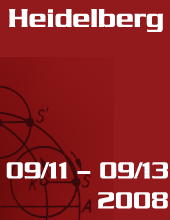Jochen
Apel, University of Heidelberg
James Bogen,
Brigitte Falkenburg,
Uljana Feest, TU Berlin
Stephan
Hartmann,
Andreas Huettemann,
Benedikt Löwe, University of Amsterdam
Michela Massimi, UCL
James McAllister,
Sandra Mitchell,
Thomas
Müller, University of Utrecht
Samuel Schindler, University of Leeds
Eran Tal,
Ioannis
Votsis, University of Düsseldorf
James Woodward, CALTECH









